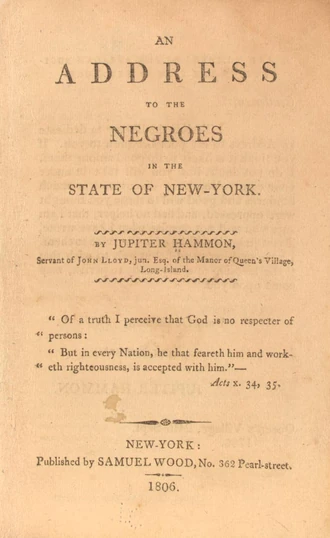
Jupiter Hammon (1711-1806), Address to the Negroes in the State of New-York, 1806. Courtesy Wikimedia Commons.
Jupiter Hammon (October 17, 1711 - before 1806) was an American poet who became the first African-American published writer in the United States when a poem appeared in print in 1760.
Life[]
Hammon was born a slave and was owned by 4 generations of the Lloyd family of Queens on Long Island, New York. His parents were both slaves. His father, called Opium, unlike most slaves could read and write. Jupiter Hammon was a favorite servant, clerk, farmhand, and artisan in the Lloyd family business. Hammon was allowed to attend school and was a fervent Christian, as were the Lloyds.
His 1st published poem was written on Christmas Day, 1760. "An Evening Thought: Salvation by Christ with Penitential Cries; composed by Jupiter Hammon, a Negro belonging to Mr. Lloyd of Queen's Village, on Long Island, the 25th of December, 1760" appeared as a broadside in 1761.[1] 3 other poems and 3 sermon essays followed.
Hammon was a slave his entire life, and the date of his death is unknown. He was living in 1790 at the age of 79, and died by 1806. Hammon was a devout Christian, and is considered one of the founders of African American literature.
Writing[]
On September 24, 1786, Harmon expressed his views on slavery when he delivered his "Address to the Negroes of the State of New York", also known as the "Hammon Address", before the African Society. Hammon wrote the speech at age 76 after a lifetime of slavery. It contains his famous words, "If we should ever get to Heaven, we shall find nobody to reproach us for being black, or for being slaves."[1][2] In Hammon's "Address" he said that while he personally had no wish to be free, he did wish others, especially “the young Negroes, were free.”
The speech draws heavily on Christian motifs and theology. For example, Hammon said that Black people should maintain their high moral standards precisely because being slaves on Earth had already secured their place in heaven. Hammon's speech also promoted the idea of a gradual emancipation as a way of ending slavery.[3] It is thought that Hammon stated this plan because he knew that slavery was so entrenched in American society that an immediate emancipation of all slaves would be difficult to achieve. His speech was initially published by the New York Quakers, and was later reprinted by several groups opposed to slavery, including the Pennsylvania Society for Promoting the Abolition of Slavery, because the strong religious motifs and ideas of gradual emancipation were moderate enough to be taken seriously by whites, but still firmly rooted in abolition.
Recognition[]
Hammon's famous speech and his poetry are often anthologized.
Publications[]
Poetry[]
- An Address to Miss Phillis Wheatly, Ethiopian Poetess. Hartford, CT: [Watson & Goodwin?], 1778.
Non-fiction[]
- An Address: To the Negroes in the state of New-York. New York: Printed by Carroll & Patterson, 1787.
Collected Editions[]
- Jupiter Hammon, American Negro Poet: Selections from his writings and a bibliography (edited by Oscar Wegelin). New York: C.F. Heartman, 1915; Miami, FL: Mnemosyne, 1967; Freeport, NY: Books for Libraries Press, 1970.
- America's First Negro Poet: Complete works (edited by Stanley Austin Ransom). Port Washington, NY: Kennikat, 1970.
- Collected Works: Poems and essays (edited by Cedrick May). Knoxville, TN: University of Tennessee Press, 2017.
A Poem For Children With Thoughts On Death (Jupiter Hammon Poem)
Except where noted, bibliographical information courtesy WorldCat.[4]
See also[]
References[]
Notes[]
- ↑ "An Evening Thought :: :: University of Virginia Library". 1761. http://xtf.lib.virginia.edu/xtf/view?docId=chadwyck_aap/uvaGenText/tei/chaap_D046.xml. Retrieved 2010-04-24.
- ↑ "An address to the negroes in the state of New-York @ U.Va. Library". http://virgobeta.lib.virginia.edu/catalog/u287820. Retrieved 2010-04-24.
- ↑ "Gale Schools - Black History Month - Literature - An Address to the Negroes". http://www.galeschools.com/black_history/literature/address.htm. Retrieved 2010-04-24.
- ↑ Search results = au:Jupiter Hammon, WorldCat, OCLC Online Computer Library Center Inc. Web, May 8, 2018.
External links[]
- Poems
- An Evening Thought
- Jupier Hammon b. 1711 at the Poetry Foundation.
- Jupiter Hammon at PoemHunter (4 poems)
- Books
- Jupiter Hammon at Amazon.com
- About
- Jupiter Hammon: America's First Published African-American Poet at About.com
- Jupiter Hammon, the Father of African American Poetry at ThoughtCo.
| This page uses Creative Commons Licensed content from Wikipedia. (view article). (view authors). |
| This page uses content from Wikinfo . The original article was at Wikinfo:Jupiter Hammon. The list of authors can be seen in the (view authors). page history. The text of this Wikinfo article is available under the GNU Free Documentation License and the Creative Commons Attribution-Share Alike 3.0 license. |
